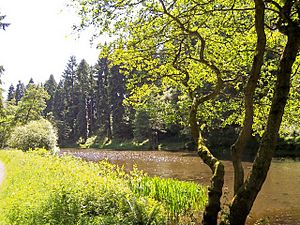Soudley Ponds facts for kids
| Site of Special Scientific Interest | |

Soudley Ponds
|
|
| Area of Search | Gloucestershire |
|---|---|
| Coordinates | 51°47′56″N 2°29′27″W / 51.79887°N 2.49082°W |
| Interest | Biological |
| Area | 7.04 hectare |
| Notification | 1984 |
Soudley Ponds, also called Sutton Ponds, are a beautiful spot in the Forest of Dean, west Gloucestershire. There are four ponds connected together in a narrow valley. Tall Douglas fir trees grow all around them.
These ponds are very special! They are a 'Site of Special Scientific Interest' (SSSI). This means they are protected because of their important nature. They became an SSSI in 1984. The ponds are also known as a Key Wildlife Site (KWS).
The History of Soudley Ponds
For a long time, people thought these ponds were dug in the 1700s. They believed the ponds supplied water to big furnaces nearby. These furnaces were used to make things from metal. It was also thought that monks from Flaxley Abbey dug them for fish.
However, old maps tell a different story. A map from 1847 shows only a stream where the ponds are now. So, it's now believed the ponds were made later. They were likely created as fish ponds after 1836. This was when a mine owner named William Crawshay II bought the land.
In 1899, William Crawshay's son, Robert Crawshay, sold the ponds. They became part of the Crown's land. From then on, people could rent the ponds for fishing. The ponds became how they look today in 1906. This was thanks to Arthur Morgan, who rented them that year. The lowest pond is still called Morgan's Pool after him.
Who Looks After the Ponds?
Today, the Forestry Commission takes care of Soudley Ponds. Natural England has officially named them an SSSI. This makes them one of the most lovely places in the Forest of Dean. They are especially beautiful in spring and autumn.
The ponds are still used for fishing. The Soudley Fishing Consortium uses them for the same reason they were made. It's a great place for anglers to enjoy nature.

